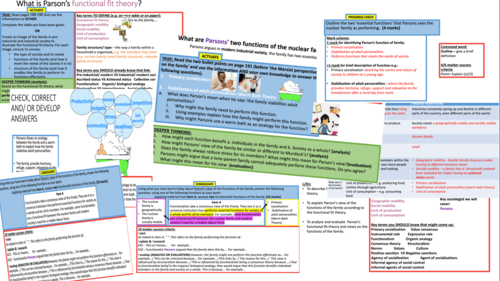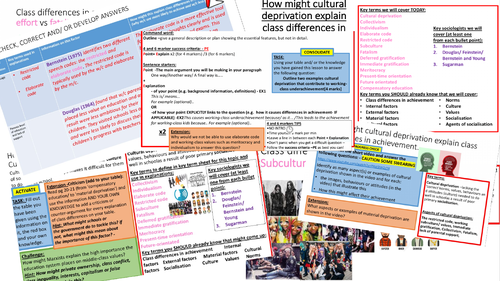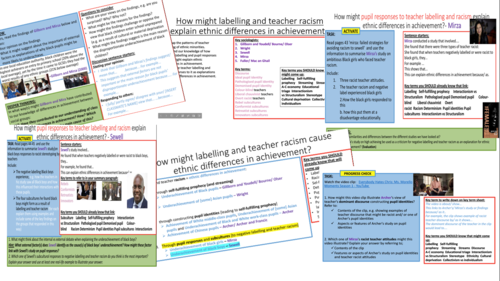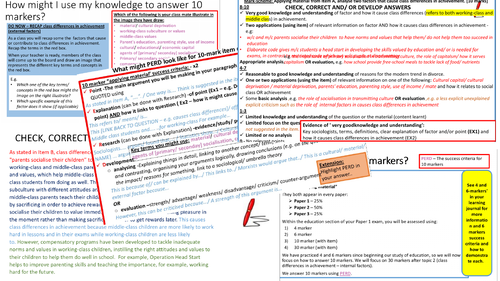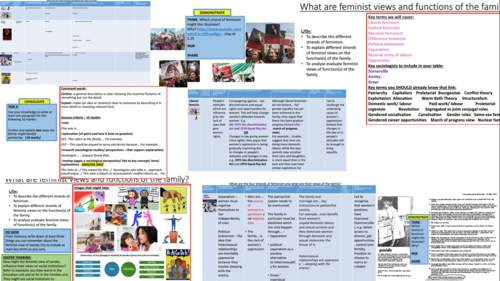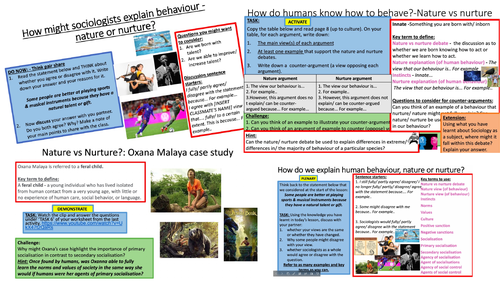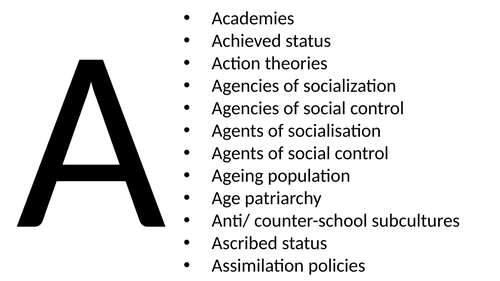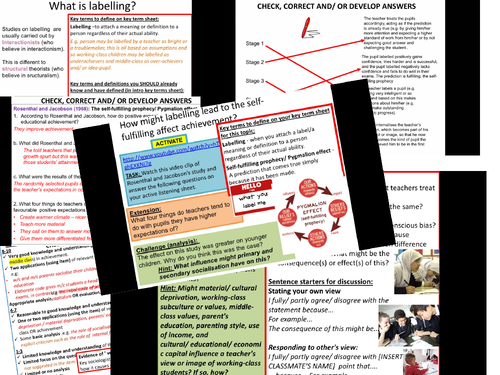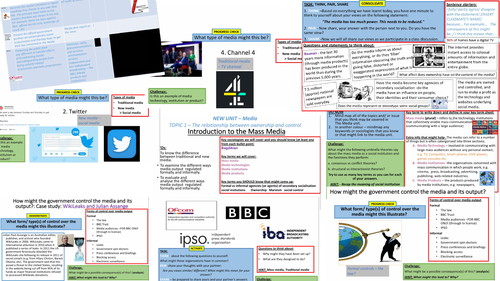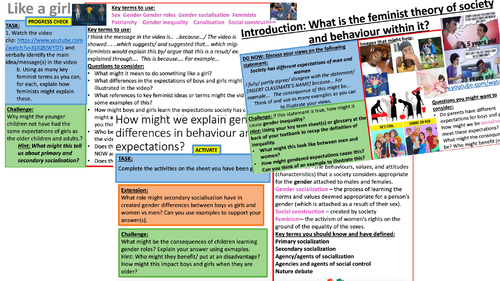
111Uploads
12k+Views
3k+Downloads
All resources

AQA A-level Sociology Families: Theories of the family – Parson’s view of the family
Detailed and differentiated (up and down) student-led lesson that examines, analyses and evaluates functionalist Parsons view of the family (functional fit theory) and his functions (mainly stabilisation of adult personalities – NOT primary socialisation).
Lesson explores the key terms: Functional fit theory, Stabilisation of adult personalities (Warm Bath Theory), Functional fit theory, Geographic mobility, Social mobility, Unit of production and Unit of consumption.
Lesson makes links to general functionalist key terms and family key terms that students might have previously been taught.
Main activity makes reference to AQA A-level Book 1 by Townsend
***** MOST ACTIVITIES INCLUDE ANSWERS****
Starter assesses prior learning on family topics: couples, childhood and Murdock’s functions.
***** WORKSHEETS AT THE END OF THE PPT**

Sociology Education Class differences in achievement - Cultural deprivation
Detailed and differentiated (up and down), student led lesson that explores collectivism vs individualism, elaborate vs restricted code, subculture, fatalism vs meritocracy, deferred vs immediate gratification, meritocracy, present-time vs future orientated vs compensatory education to enable students to understand the role of cultural deprivation in causing class differences in achievement/ working-class underachievement. Also covers and supports students in answering 4/6 markers using a success criteria and student-friendly mark-schemes.
ANSWERS TO MAIN ACTIVITIES AND EXAM QUESTIONS ARE INCLUDED
COMES WITH FREE A-LEVEL HELP SHEET AND KEY TERM SHEET FOR TOPIC 1 & 2
**Made for AQA A-level but can be easily used for other specs (just need a different source of information/ textbook) differentiated down for GCSE) lesson **
Uses and refers to ’ AQA A Level Sociology Book One Including AS Level: Book one 3rd Revised edition by Rob Webb, Hal Westergaard, Keith Trobe, Annie Townend ’ textbook

AQA A-level Sociology: Education Topic 3 Ethnic differences - Negative labelling and teacher racism
Detailed and differentiated (up and down) student led lesson that explores the following so students are able to understand and explain how negative labelling and teacher racism might cause ethnic differences in achievement:
Ideal pupil identity , Pathologised pupil identity, Demonised pupil identity, Colour-blind teachers, Liberal chauvinist teachers, Overt racist teachers, Rebels subcultures, Conformist subcultures, Retreatist subcultures, Innovators subcultures
Differentiates between Gillborn and Youdell (or Bourne or Olser), Sewell, Mirza’s view of how teachers might be racist and how this might affect achievement for different groups.
Lesson makes links to the following terms that students should have covered before completing this lesson: Labelling, Self-fulfilling prophecy, Streaming, Streams A-C economy, Educational triage, Interactionism vs Structuralism, Stereotype, Ethnicity Cultural deprivation Collectivism vs individualism.
**NOTE – Students will need to have basic to reasonable knowledge of labelling and the self-fulfilling prophecy. **
Uses and refers to ’ AQA A Level Sociology Book One Including AS Level: Book one 3rd Revised edition by Rob Webb, Hal Westergaard, Keith Trobe, Annie Townend ’ textbook
RESOURCES CAN BE FOUND AT THE END OF THE PPT.

How to answer 10 markers for Sociology Education Class differences in achievement (external factors)
Detailed and differentiated (up and down), student led lesson that explores how to answer 10 markers, in particular for education topic 1 - class differences in achievement (external factors). Can also be used as a revision lesson for topic 1 (class diff in achievement -external factors) Includes student friendly success criteria PERD (Point+Explanation+Research+Develop) success criteria and student-friendly mark-scheme.
ANSWERS TO MAIN ACTIVITIES AND EXAM QUESTIONS ARE INCLUDED
**Made for AQA A-level but can be easily used for other specs (just need a different source of information/ textbook) differentiated down for GCSE) lesson **
Bundle

SOCIOLOGY Research Methods - INTRO, PET ISSUES, SAMPLING METHODS
Detailed and differentiated set of student-led lessons made for AQA A/AS-LEVEL SOCIOLOGY but can be differentiated for GCSE (see below-L2) and any SPEC (as it goes through the main methods, terms, issues for social research in general:
Intro to Methods
Explores primary vs secondary methods, quantitative vs qualitative methods, validity and reliability as a way to introduce students to the main main research methods.
Explores practical (time, cost, research opportunity, requirements of funding body & subject matter), ethical (informed consent, confidentiality, harm to participants, vulnerable groups & covert research) and theoretical issues (validity, reliability, representativeness, methodological perspectives, interpretivism & positivism).
*** Catered towards A-LEVEL AQA sociology but if main activity can be replaced, the rest can be used for GCSE and ANY SPEC.**
*** Main activity uses pages 92-94 of the AQA A Level Sociology Book One Including AS Level: Book one 3rd Revised edition by Rob Webb, Hal Westergaard, Keith Trobe, Annie Townend**
explores sampling methods, sampling frame, representative (sample), generalising (findings) and the relationship between these and positivism vss interpretivism and theoretical issues
LESSON COMES WITH ANSWERS

AQA A-Level Sociology Media PLC (EDITABLE)
Personal Learning Checklist for the Media unit in the AQA A-level Sociology syllabus.

AQA A-Level Sociology Families and Households PLC (EDITABLE)
Personal Learning Checklist for the Families and Households unit in the the AQA A-level Sociology syllabus. PLC includes topic and page numbers from the Westergaard and Townsend book one for content students my find hard to locate.

AQA A-Level Sociology Crime and Deviance PLC (EDITABLE)
Personal Learning Checklist for the Crime and Deviance unit in the AQA A-level Sociology syllabus.

AQA A-level Sociology Families: Theories of the family – Feminist views of the family (UPDATED))
Detailed and differentiated (up and down) student-led lesson that examines and evaluates Liberal (Somerville), Radical (Greer), Marxist (Ansley) and Difference feminist views and functions of the family.
Lesson explores the concepts: Political lesbianism , Separatism, Reserve army of labour, Oppression
Lesson makes links to general feminist key terms and other key terms that students might have previously been taught, e.g. Patriarchy, Capitalism, Proletariat, Bourgeoisie, Conflict theory, Exploitation, Alienation, Gendered socialisation Canalisation Gender roles, Warm Bath Theory, Structuralism, etc.
Main activity makes reference to AQA A-level Book 1 by Townsend
***** ALL ANSWERS INCLUDING ANAYSIS FOR TABLE ACTIVITY NOW INCLUDED ****
NOW INCLUDES MODEL PARAGRAPH FOR 10 MARKER
***** WORKSHEETS AT THE END OF THE PPT****

AQA A-Level Sociology Theory and Methods PLC (EDITABLE)
Personal Learning Checklist for the Theory and Methods unit in the AQA A-level Sociology syllabus. PLC includes topic and page numbers from the Westergaard and Townsend book one and two for content students my find hard to locate.

AQA A-Level Sociology Methods in Context PLC (EDITABLE)
Personal Learning Checklist for the methods in context unit in the the AQA A-level Sociology syllabus. PLC includes topic and page numbers from the Westergaard and Townsend book one for content students my find hard to locate.

Nature vs nurture - How might we explain behaviour?
Detailed student-led lesson that explores the nature vs debate, norms, values, socialisation (primary/secondary) and social control as an introduction to Sociology. Uses page 8 of the AQA A-level Book 1 by Townsend to introduces students to the nature vs nurture debate but this can be replaced and the rest of the lesson can still be used. Comes with worksheet used for two of the activities and key term sheet for the lesson. Can be used for both GCSE and A-level.

Sociology Display - A-Z Key terms (YEAR 1)
A-Z list of key sociological terms for:
Education
Family
Research Methods
Could not think of key terms for letters: W, K, J, Z, Y, Z
Made for AQA A-level but can be modified for ANY SPEC and for GCSE.

Sociology Education Class differences in achievement - Labelling
Detailed and differentiated (up and down), student led lesson that explores labelling, self-fulfilling-prophecy/ pygmallion effect, determinism and interactionism to enable students to understand the role of labelling in causing class differences in achievement/ working-class underachievement/ middle-achievement.
**ANSWERS TO MOST ACTIVITIES **
COMES WITH FREE A-LEVEL HELP SHEET AND KEY TERM SHEET FOR TOPIC 1 & 2
**Made for AQA A-level but can be easily used for other specs (just need a different source of information/ textbook) differentiated down for GCSE) lesson **
Uses and refers to ’ AQA A Level Sociology Book One Including AS Level: Book one 3rd Revised edition by Rob Webb, Hal Westergaard, Keith Trobe, Annie Townend ’ textbook

AQA A-Level Sociology Education PLC (EDITABLE)
Personal Learning Checklist for the education unit in the the AQA A-level Sociology syllabus.

Introduction to the Mass Media (& informal and formal controls of output/ content)
Detailed and differentiated (up and down), student led lesson that introduces students to the different forms of mass media and formal and informal methods used by the government to control media output formally and informally.
Examines the following concepts:Mass media, Media technologies , Media institutions, Media products.
**Made for AQA A-level **but can be easily used for other specs
ANSWERS TO MAIN ACTIVITIES INCLUDED
RESOURCES FOR LESSON CAN BE FOUND AT THE END OF PTT
**Based on content in textbook - 'SOCIOLOGY For AQA Volume 2 by Browne, Blundell & Law ** - BUT LESSON REQUIRES NO TEXTBOOK

AQA A-level Families- Couples: Intro to the family structures/ types
Detailed and differentiated (up and down) student-led lesson that examines and analyses the following key terms to introduce students to the main family structures: Family, Household,Family structure/ type, Nuclear family, Lone-parent family, Same-sex family, Reconstituted family (or blended family) , Beanpole family, Extend family (horizontally and vertically) , Empty-nest family, Cohabitating couples, Contemporary society, Traditional, Family diversity, Living Apart Together/ LATs (extension)
***** ANSWERS for MOST MAIN activities INCLUDED****
***** ALL RESOURCES INCLUDED AND CAN BE FOUND OUT THE END OF PPT *****
Bundle

Sociology Education AS/A-level Sociology Education Class differences in achievement Topic 1 (external factors) &2 (Internal factors)
Lessons:
L1 Material deprivation
Detailed and diiferentiated (up and down), student led lesson that explores class differences in achievement the role of material deprivation in causing or contributing to it. Introduces students to material vs cultural factors and external vs internal factors. Also introduces students to how to answer 4 and 6 markers using a success criteria and student-friendly mark-schemes.
L2 Cultural deprivation
Detailed and differentiated (up and down), student led lesson that explores collectivism vs individualism, elaborate vs restricted code, subculture, fatalism vs meritocracy, deferred vs immediate gratification, meritocracy, present-time vs future orientated vs compensatory education to enable students to understand the role of cultural deprivation in causing class differences in achievement/ working-class underachievement. Also covers and supports students in answering 4/6 markers using a success criteria and student-friendly mark-schemes.
L3 Cultural capital
Detailed and differentiated (up and down), student led lesson that explores cultural, educational and economic capital and compensatory education to enable students to understand the role of cultural deprivation in causing class differences in achievement/ working-class underachievement. Also covers and supports students in answering 4/6 markers using a success criteria and student-friendly mark-schemes.
L4 - How do I answer 10 markers?
Detailed and differentiated (up and down), student led lesson that explores how to answer 10 markers, in particular for education topic 1 - class differences in achievement (external factors). Can also be used as a revision lesson for topic 1 (class diff in achievement -external factors) Includes student friendly success criteria PERD (Point+Explanation+Research+Develop) success criteria and student-friendly mark-scheme.
L5 Labelling
Detailed and differentiated (up and down), student led lesson that explores labelling, self-fulfilling-prophecy/ pygmallion effect, determinism and interactionism to enable students to understand the role of labelling in causing class differences in achievement/ working-class underachievement/ middle-achievement.
L6 Streaming and pupil subcultures
Detailed and differentiated (up and down), student led lesson that explores labelling, streaming, differentiation, polarisation, anti-school subcultures, pro-school subcultures, pupil subculture, A-C ecnonomy, educational triage to enable students to understand the role of streaming and pupil subcultures in causing class differences in achievement/ working-class underachievement/ middle-class achievement. Also covers and supports students in answering 4/6 markers using a success criteria and student-friendly mark-schemes.
L7 Class identities
Detailed and differentiated (up and down), student led lesson that explores pupil identity, class identities, habitus, symbolic capital, symbolic violence, nike identities, style performances to enable students to understand the role of class identities in causing class differences in achievement/ working-class underachievement/ middle-class achievement. Also covers and supports students in answering 4/6 markers using a success criteria and student-friendly mark-schemes.
L8-9 How do I answer 20/30 markers?
Detailed and differentiated (up and down), student led lesson that explores:
the main assessement objectives - AO1, AO2,AO3
how to answer 30 markers
allows studeNts to revise class differences in achievement (external and internal factors).
L10-11 Assessment & FEEDBACK (DIRT) Lesson
Asessment questions for A-level Sociology (4, 6, 10, 30 markers) AND detailed and differentiated (up and down), student led feedback DIRT lesson that explores recaps how to answer4, 6, 10 & 30 markers and provides answers for assessment. Includes student friendly success criteria mark-schemes.
**L12 - Folder lesson **
Explores the importance of organisation and guides and supports students in organising their classwork for class differences in achievement external and internal factors (Topic 1& 2 AQA A/ AS-level spec)
Includes:
Assessment tracker
Example of how folder might be organised
Reflection activity
**ANSWERS TO MAIN ACTIVITIES AND EXAM QUESTIONS ARE INCLUDED
**
Uses and refers to ’ AQA A Level Sociology Book One Including AS Level: Book one 3rd Revised edition by Rob Webb, Hal Westergaard, Keith Trobe, Annie Townend ’ textbook

Introduction to feminism
Detailed and differentiated student-led lesson that explores sex, gender, gender roles, patriarchy, socialisation, gender inequality as a way to introduce students to the main feminist views of society and ideas. Can be used for ANY SPEC. Catered towards A-level students but can easily be simplified and/ or for younger students.
Bundle

KEY TERMS SHEET - AQA A-level Sociology Education: Topics 1-5
Alphabetical key term sheet for AQA A-level Sociology Education Topics 1-5. Contains the main key terms used in Topic 1-6 of the education unit for AQA A-level Sociology:
-Topic 1 - Class differences in achievement (external factors)
-Topic 2 - Class differences in achievement (internal factors)
-Topic 3 - Ethnic differences in achievement
-Topic 4 - Gender differences in achievement
-Topic 5 - Role of education
-Topic 6 - Education policy
*** Includes scaffolding, e.g. some sentence starters (to model to students how to incorporate key sociologists into their definitions) and prompts to help students remember how key term links to the topic. **
*** Includes a section with key terms that students should know from previous learning (for topic 3 sheet ethnic differences - this would be terms that link to key terms covered in class differences in achievement, e.g. labelling, pupil identities, material deprivation, speech codes etc) that link to this topic. **
Good form of revision for students and can be used as a revision resource to develop AO1 once filled out.
**BASED ON CONTENT textbook - AQA A Level Sociology Book One Including AS Level: Book one 3rd Revised edition by Rob Webb, Hal Westergaard, Keith Trobe, Annie Townend ’ textbook

